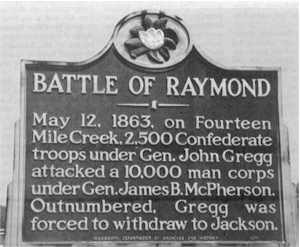| A Kaleidoscope of History Post Civil War Years
For several weeks after the Battle of Raymond the "blue coats" held possession of the town. George Harper, at the time editor of the Gazette, commented... "families were stripped of almost everything during that dreadful and never-to-be forgotten night. Fortunately there were no burnings but the office and press of the Gazette were destroyed." Many of the town citizens were subjected to "plunder" and robbery. Basically, whatever the Union troops wanted - meat, food or personal possessions -they took! Whatever they felt like destroying - they destroyed! The times were "dismal ones" for the citizens of Raymond, as well as Mississippi and the south in general. Several accounts have been recorded by citizens of Raymond that witnessed the "saddest day in the history of the town". One particular account is taken from a scrapbook of a woman formerly from Raymond (Mrs. Bankston) and recorded by Miss Mary Ratliff. "On the morning of the 12th of May, 1863 all was excitement in the town, for we knew a battle was imminent. Many people left town, knowing that it might be shelled. My next door neighbor was driving by my house in her carriage with her husband and child, and in the wagon following were her house servants, all refugeeing to Georgia. As Caroline, the faithful servant passed she called to me and said 'we is going to Georgia and leaving' everything. You might just as well go and get anything your want, it will all be gone before we get back." (History of Raymond, Jane Brent). Another account of the tragic day was recorded by Estelle Trichell Oltrogge from Jacksonville, Florida. The name of her article CONFEDERATE VETERAN, RAYMOND, MISSISSIPPI IN WAR TIMES, reminisces the Battle of Raymond as she remembered it as a child. "I was a six year old child when the war began but I recall May 12, 1863 when the Battle of Raymond was fought and July 4, 1863 when Vicksburg surrendered. My mother and Martha Dabney were in the habit of taking long walks before breakfast and would sometimes walk toward Cooper's Well or Bolton. One morning they had planned to walk in the direction of Utica when Judge Dabney sent a note saying there were rumors of a battle and it would be best to postpone the walk. That was the day of the Battle of Raymond. The battle began early in the morning and all day long people lined the streets listening to the boom of cannons and the rattle of smaller firearms. The first wounded soldier I saw was a young Yankee officer with red hair. He was holding his head in his hands. I felt sincere pity for him even though he was a Yankee. The day after the battle General Grant with all of his men passed thru Raymond on the way to Jackson. As they neared Jackson the home of General Freeman was passed. Miss Freeman stepped to the front door with a Confederate flag in her hand and sang "Bonnie Blue Flag" whereupon the Yankees promptly burned down her house." Mississippi writer, Willie Morris, makes reference to the Civil War in one of his earlier books, NORTH TOWARD HOME. "My great grandfather, George Harper, came south as a young man. He was editor of the HINDS COUNTY GAZETTE in Raymond, a thriving town near Jackson. During the Civil War, as I was told it is a boy, the family cow disappeared; my great-grandmother with seven mouths to feed, went to the Captain of the Federal troops and complained in great agitation that his soldiers had stolen her cow. 'Find this lady a tow', the Captain ordered is staff, then graciously escorted her home. Mama said 'he was such a nice and honest man who cared'; but when the original cow wandered home the next day and the herd increased to two, Yankee chivalry was not rewarded with the return of the merchandise."
Willie also mentions in his book that during the War his great-grandfather, one of finest citizens of Raymond, had to turn to "one mule dirt farming" in order to provide for his family. Most of the large plantations in the Raymond area were reduced to a state of destitution as a result of the economic catastrophe of the time. Thomas Dabney, owner of Burleigh, a large cotton plantation between Raymond and Dry Grove, put his plantation up for auction with the condition that he would have the privilege of buying it back in a certain time. With his 500 slaves gone Dabney, age seventy, picked up a hoe and began to work the soil himself. Three years before his death in 1885 the last of the debt on Burleigh was paid. (History of Raymond, Ferguson). The Civil War, now approximately 122 years old, has always remained in the minds and hearts of the American people. In some cases - such as the movie GONE WITH THE WIND - the stories have international appeal. Books pertaining to the Civil War line the library shelves. Americans, particularly Southerners, have an intense desire to keep this part of our heritage alive. As tragic as it was, the war contributed to an outgrowth of American music, literature and art. Perhaps the brief saying on the Raymond's Monument to Confederate Soldiers best says it all: "We of the South Remember; We of the South Revere." Historical sources. History of Raymond, Jane Brent; History of Raymond, Bill Ferguson; North Toward Home, Willie Morris, and Confederate Veteran, Estelle Trichell Oltrogge. © 1998-2005, all rights reserved |

